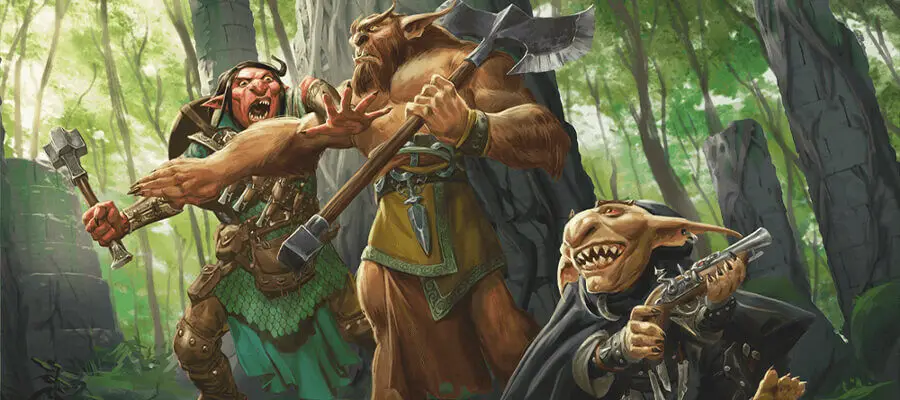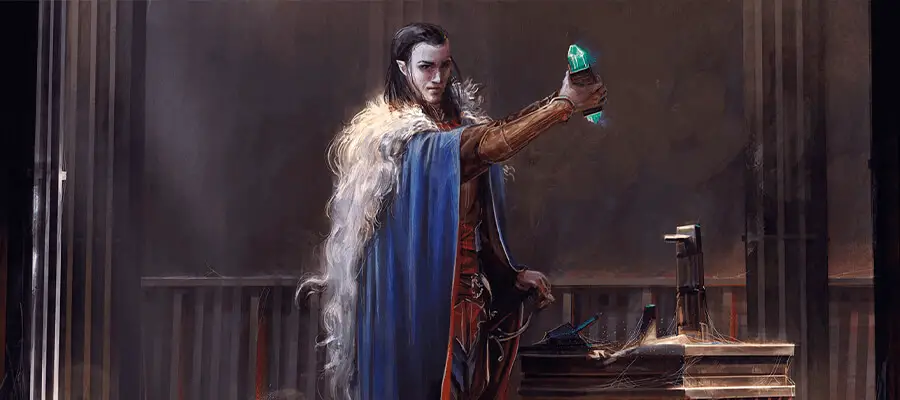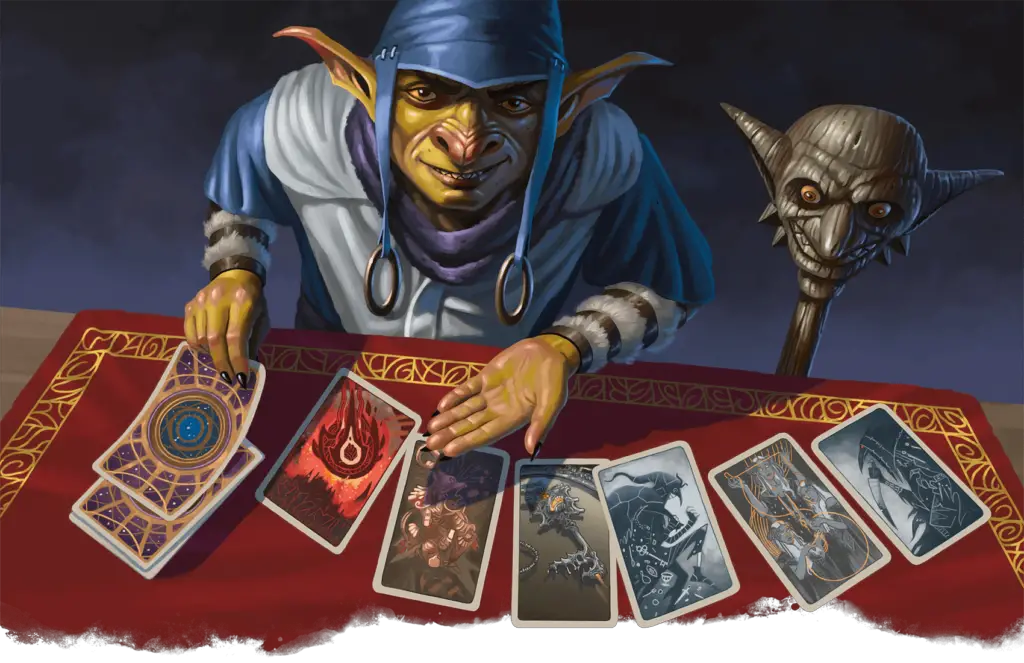D&D homebrew content concern article featured image is from Eberron: Rising from the Last War. This article contains affiliate links to put gold in our coffers.
For this article, we’ve done something a little different. Since I’ve made a career out of designing third-party stuff for Dungeons & Dragons 5e, I’ve heard dozens of concerns regarding allowing homebrew stuff at a D&D table. So much so that defending my work is something most of us professional designers just see as “par for the course” these days.
Flutes sent me a series of prompts he wrote based on concerns from TTRPG spaces about allowing third-party work on their tables. I’m going to do my best to address each one of them here from my own past experience as a designer. Plus, I get to put my philosophy minor to work.
D&D Homebrew Content Concern #1
Concern: There has been an issue with big names releasing mediocre, imbalanced, or unfinished content using their celebrity, which has led many people to ban all homebrew.
Taron: This is a “Hasty Generalization Fallacy.” If you get a bad steak at one restaurant, do you assume all steak must be bad? The poor quality of one piece of work doesn’t speak for all of it.
Now, I will make a more pointed response to celebrity-hyped homebrew. A big issue happens when celebrities do these sorts of “fan playtest” cycles; the fans are great at telling you what sounds fun, cool, or exciting but not necessarily being critical of your work. Your audience is great for telling you if the vibe is great, but those that recognize and have the social skills to healthily address flaws in mechanics are exceedingly rare.
Being critical of a creator’s work, especially one you admire, can be an exercise in anxiety for some. This is why I recommend to any large creator out there: stop using your Patreon sponsors for balance feedback. You aren’t exactly getting unbiased data from people that are financially supporting you. You should absolutely beware content that a creator promotes as being balanced by their fans’ feedback.
Now, fans are fantastic at letting you know how they feel about something, but getting back real data on how healthy the thing was at the table requires a different philosophy to approaching this content. This really requires professional consultation, which I have recently seen Mr. Rhexx doing with his Monster Classes, and I admire Rhexx’s openness to having his work open to professional critique.
I won’t really get into the thick of it with other celebrity brews, but I will say that I’m significantly more trusting of a brewer who is willing to update their work after feedback rather than blindly continue to sell it despite knowing of the errors.
D&D Homebrew Content Concern #2
Concern: Third-party isn’t compatible with my group’s digital tools, like D&D Beyond.
Taron: Yeah, D&D Beyond is a hard one to work around. I’ve thankfully had the luxury of Grim Press offering to convert my work for Fantasy Grounds and several people offering to do Foundry conversions, but D&D Beyond just doesn’t seem like it’s anywhere on the horizon for us. This is not necessarily because D&D Beyond doesn’t want to. D&D Beyond reached out to Benjamin Huffman before the Wizards of the Coast buy-out to try and put the Pugilist on D&D Beyond. According to Benjamin, the talks just sort of stopped without a real reason why.
If this is a reason deterring you from including third-party stuff at your table, I wish I had a solution for you. Many designers love for our work to be considered for inclusion in D&D Beyond, so the onus on getting this going is on Wizards of the Coast. Since they already take a 20% fee from our work on the DMsGuild, I could easily see an 80/20 split on D&D Beyond sales being basically free money for them. Trust me, I’ve hoped this could be a thing for a long time.
D&D Homebrew Content Concern #3
Concern: Third-party overperforms compared to options in the official books. “It’s overpowered!”
Taron: This might be either a hasty generalization or an appeal to authority, maybe a mix of the two. I prefer to do as little comparative balance analysis as possible because I feel like that intrinsically hinders innovation in the system. There’s a sort of “abstract” we understand in design about when a class should be getting stronger, what general damage per round numbers are expected and acceptable for reasonable play, or how much flexibility we can allow for in certain features. However, this “abstract” isn’t always useful in experimental design, especially when you’re making something fundamentally different.
In some ways, yes, I agree with this concern, and that’s the point. Third-party options are typically born of concepts that can’t be achieved through official options. Why bring a new class to the table if it doesn’t do anything… well… new? This doesn’t mean this “new” thing is always inherently unhealthy for the game. It’s a new way to engage with the D&D format, and that’s a beautiful thing about this ever-evolving game.
Now, I ask this concerned, hypothetical person if they really feel the official books are completely balanced against each other. Can this person truthfully say the Circle of the Moon and the Circle of the Land are on completely equal footing? There’s nothing wrong with admitting the game has its faults.
Finally, I just want to say that not all third-party designers treat this like a hobby. Plenty of us put in the blood, sweat, and tears to make polished works that are reasonable for play and fulfill a niche that the official game doesn’t support.
Oh, and thirteen isn’t some “sacred number” wherein any other class concept can just be a subclass. This is a completely subjective and reductive opinion that cannot be falsified. People said this before WotC added Artificer; I promise you there are plenty of playstyles that the current system doesn’t allow to be expressed.
D&D Homebrew Content Concern #4
Concern: Only Wizards of the Coast makes balanced content.
Taron: Okay, this is definitely an appeal to authority argument, right? People argue that “balance is subjective,” and I find that a more interesting discussion to engage with. However, this concern is just straight-up not true, and I’ll tackle it from two perspectives of the argument:
“Wizards of the Coast makes balanced content.”
Since 2019, Wizards of the Coast has published plenty of straight-up unfinished work that we were calling out in Unearthed Arcana surveys. This isn’t restricted to player character options either. My heart goes out to the parties that went up against the serial killer in Icewind Dale below 3rd level. Official books get errata. People make mistakes, even the creators of the game. Plenty of people deserve their work published officially for use in the game.
“Only Wizards of the Coast makes balanced content.”
I’m sitting over here laughing in Coffeelock. You all know the design team at Wizards of the Coast were all third-party creators at one point, right? I’m not sure if people think there’s some magical elixir of balance that people consume or that there’s some rigorous internal playtesting phase, but… well, there isn’t.
D&D Homebrew Content Concern #5
Concern: Fear of supporting a person or group that is racist, homophobic, transphobic, anti-Semitic, etc. (list not exhaustive).
Taron: I thought this was Flutes screwing with me for about 30 seconds, and then I was like… “Oh, yeah… I guess that is a legitimate concern, huh?” For those not in the loop, the TTRPG scene has had an issue with anti-Semitism, racism, homophobia, and transphobia. Anyone denying this clearly hasn’t been paying attention. Most recently, nazi sympathizer Dave Johnson released a playtest of the NuTSR’s Star Frontiers, which featured a “Negro” race alongside a “Nordic” race. The former’s maximum Intelligence score is +9, and the latter’s 13+ in all attributes. This clearly mirrors one of the core philosophies of Eugenics, and we should absolutely be calling this out.
Now, I know I try to make sure my work doesn’t mirror any hateful ideals. I have worked with other designers who have likewise commissioned cultural consultants and sensitivity readers to do the same. Ross Leiser’s Shaman is a shining example of handling class narrative with care for the cultures, traditions, and practices that inspired it. I don’t know the hearts of everyone; that’s pretty much impossible to tell without knowing the history of their actions.
D&D Homebrew Content Concern #6
Concern: Thinking D&D Beyond listings have the WotC seal of approval, so they don’t go for anything else. Thinking D&D Beyond is all official content.
Taron: D&D Beyond has all the disclaimers in place to refute this one. It’s up to the user to decide what they will or won’t allow for their table… oh hey! Third-party! Whaddya know!
D&D Homebrew Content Concern #7
Concern: It requires significant time to review and approve content for play.
Taron: This entry barrier is why I started doing class guides on my channel. It’s also why I keep buy-in at the forefront of my mind when designing something. There are content creators who do work to try and help this buy-in, so chances are if it’s from a designer who has shown consistent, quality work, there’s likely at least one review or guide out there.
In all honesty? It should only take you about 15 minutes to sit down and understand what a class does from levels 1 to 20. This is a note for everyone out there, designers included. If you’ve designed something that can’t be grasped within 15 minutes, it’s unlikely it will be understood in an hour. This hurts your buy-in. Some people love a super intricate class, but I promise you the majority of people don’t and won’t trust it to be reasonable for play.
If you are evaluating a thing for reasonable play at your table, you should be looking to make sure it has a core combat loop (Action & Bonus Action covered within 2 levels), one strong save (DEX, CON, WIS) and one weak save (STR, INT, CHA)–never both, Hit Dice and armor proficiencies that designate a zone in combat, and a clearly defined role it plays in combat. This is before determining any damage numbers, which newer DMs tend to think is the thing they have to look out for more than knowing what the thing even does.
If you’re interested in seeing how I figure all this out in play, I’ve done several class guides on my channel where I explain all of this. Feel free to come by and check it out!
D&D Homebrew Content Concern #8
Concern: Why should I allow this class if I think it could be a subclass?
Taron: This is extremely reductive, and it’s proposing a subjective opinion mostly only informed by what the person believes the class to be based on its name rather than considering what it actually brings to the table. If taken to its extreme, this argument could be used to say, “Why allow any class other than Fighter? Everything could just be a subclass.”
Conclusion
Flutes speaking! I hope Taron was able to help you through your concerns regarding third-party homebrew. I’ve believed that third-party creators are doing better work than the official D&D content in recent years, so I want to help more players embrace the homebrew community.
Cast Message in the comments if you have concerns that weren’t covered by this article! We’d also welcome anyone who experienced a change of mind based on Taron’s refutes to common concerns.
You can find more content on Flutes Loot about D&D 5e homebrew right here.




